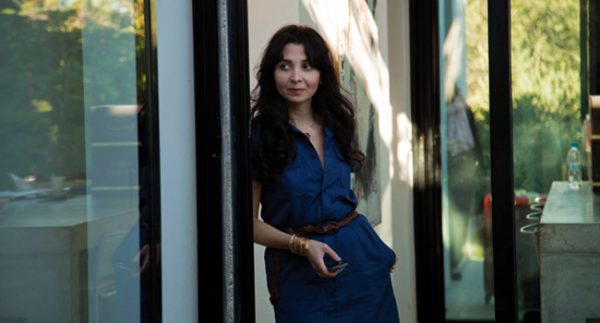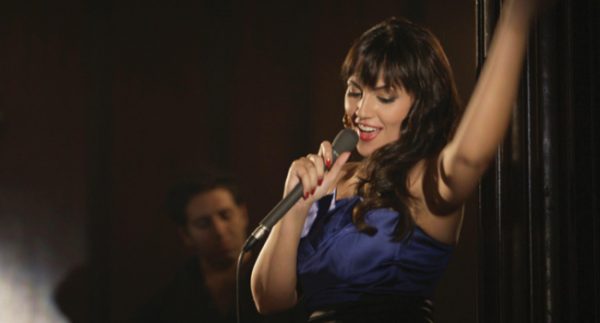All three of director Danielle Arbid’s films have been banned in her native Lebanon. She talks censorship and Arab cinema
Lebanese film censors do not like Danielle Arbid. At least, that’s the way it looks. All three of her feature-length movies have been banned in Lebanon, while she has come under regular attack for daring to make movies about politics and the sexual and social liberation of women in her native country.
Understandably, Arbid is upset. Angry even. The official line from the country’s General Directorate of General Security for the banning of her most recent film, Beirut Hotel (pictured below), was that the movie mentioned the assassination of former prime minister Rafik Hariri, claiming “the film’s depiction of the political situation would endanger Lebanon’s security”. The fact that the film featured risqué sex scenes between actress Darine Hamze and a French businessman was not cited as a reason for the ban. Only the Dubai International Film Festival has so far screened the film in the Middle East and North Africa, while an estimated one million viewers tuned into watch the film on French cable TV channel Arte in January.
“Lebanese censors are ignorant,” says Arbid (above). “The Lebanese General Security believes they are punishing an artist by censoring him or her, teaching him or her a lesson. What they are actually doing is humiliating and sickening or disgusting them. So they leave and go elsewhere, where they are welcome. Personally, I have promised myself to never again make a film in Lebanon. And I am very happy to have finally taken this decision. To turn the page, I have initiated a legal case against censorship and the Lebanese state – the first trial of its kind. This is in motion. If we win, this will help other directors and artists to be more conscious of their rights. If we don’t, my next films will not be made in Lebanon. Art is more important than a country.”
Arbid is one of a growing number of Lebanese artists battling censorship and what they view as infringements on freedom of speech and artistic expression. Now based in France, she is critical of the current state of Arab cinema and its inability to be self-critical. She also appears fairly disillusioned.
“Arab cinema is non-existent,” she says. “There are some tentative steps being taken here and there, but that’s where it ends. The representation of society offered by cinema is not acceptable to Arabs, nor the Lebanese people. If there is a representation, it has to be positive or propaganda. In other words, it has to be advertising. As for me, I do not want to wear the label of Lebanese cinema. All my movies are produced by French people with European funds. I have, in fact, become more conscious of my difference following Beirut Hotel – a difference that I had been cultivating in my other films without really admitting it. Arabs or Lebanese people do not like my movies. They are shocked by them. They do not understand them. That said, I do not belong to the West either. But I find in the West the funds necessary to realise my films. And in France I also find a favourable artistic environment.
“To have [good] cinema, you need society to be ready to accept its faults. You need to have people willing to see their image with all its shades and troubles. If [Francis Ford] Coppola were an Arab or Lebanese, he would have never produced The Godfather because his film undermines the reputation of the Italian community to which he belongs. Luckily, he was Italian-American.”
She adds: “For cinema to improve, you must accept that the people be free and that they have another opinion to you and me. Then you need a stable political and economic situation, because cinema is expensive. And above all, you must respect the artists.”
Arbid was born in Beirut in 1970 and moved to France to study literature in Paris at the age of 17. Following graduation, she worked as a journalist for five years before giving it all up to direct films, the first of which was a short called Raddem in 1998. Interested in different narrative forms, her work includes fiction, first-person documentaries and video essays, with her 2004 debut feature, In the Battlefields, following the life of a young girl in 1980s war-torn Beirut. The film won the new voices/new visions grand jury prize at the Palm Springs International Film Festival, as well as numerous other awards, while Arbid’s work has been screened twice at Cannes.
It was last year’s Beirut Hotel, however, that brought Arbid further into the spotlight, mostly for negative reasons associated with the ban. The story of a 10-day love affair between a Lebanese woman and a French man that’s fuelled by ‘fear, desire, intrigue and violence’, it also dealt with the “paradoxes of female sexual and social liberation amidst traditional cultural restraint”.
“I have only put on screen the life that surrounds me,” says Arbid. “My cinema is just a mirror. I am incapable of showing something other than what I see. I know that we must say that all this does not exist, that Lebanese women, or Arab women, never fall in love outside marriage and that they spend their days doing embroidery, but this is your problem and that of the Arab public, not mine.
“I have been insulted many times for having undermined the reputation of my native country and for providing a vehicle for the image of this free woman. I have even been insulted by Lebanese who are 25 years old and spend their days in bars. I find this indecent and cowardly. I do not lie to myself. And what I tell in my movies is not even extraordinary. It is just a girl who goes out one night and meets a French man with whom she falls in love.”
In theory, the turbulent events of the past 18 months or so have led to thousands of people wanting to tell their stories. Will these stories ever reach a wider audience?
“How to tell a good story? That’s the question I ask myself every day,” replies Arbid. “One would have hoped for a beautiful revolution, but it has turned sour. In Syria, it’s a barbaric war that could unfortunately spill into Lebanon. The honest people, the bravest ones, those are the ones who were robbed. They can always tell their stories, but nobody will want to support them and many will want to shut them up. And in the Arab world, we are used to seeing the worst that Hollywood produces. We are not going to start being interested in a poor Syrian family.”












This article made me go and watch the film. After watching it, I think that Danielle either lived too long abroad so she forgot how things are in Lebanon, or she totally has no clue about her country even before she left. Still though, her film already recognizes two intelligence services (meaning two political powers) in Lebanon. It also shows a witness of Hariri murder who gets assassinated by one of these political powers. She even gives an obvious pointer to the party involved in the crime. I can’t let go of my total satisfaction that she knows that the censorship is mainly controlled by the –let’s say- the conservative political power, which she accuses of committing the murder. As such, I can’t understand how would she expect her film to pass!